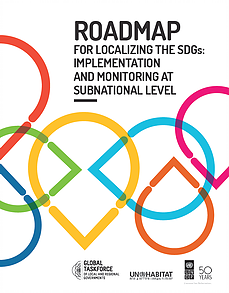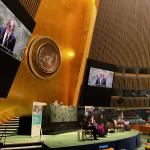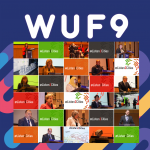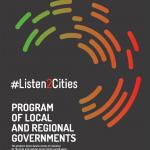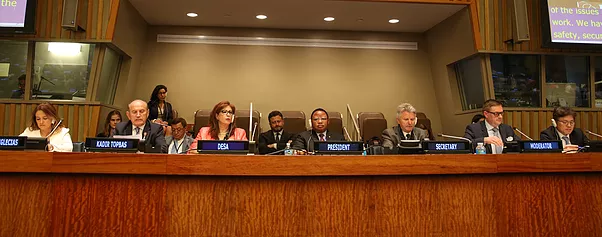
From 10-20 July, local and regional governments attended the High Level Political Forum in New York to share our perspectives on the implementation of the SDGs with the international community and to launch the Roadmap for localizing the SDGs.
The High-level Political Forum on Sustainable Development (HLPF) is United Nations’ main platform for the follow-up and review of the 2030 Agenda for Sustainable Development and the Sustainable Development Goals, adopted at the United Nations Sustainable Development Summit on 25 September 2015.
The Major Groups and stakeholders hoped that this session, the first since the adoption of the 2030 Agenda and the SDGs, would establish a strong multi-stakeholder partnership, enabling all Non-State Parties to contribute to the voluntary and thematic reviews of progress with the SDGs presented by 22 countries and supported by reviews by the ECOSOC functional commissions and other inter-governmental bodies and forums.
Local governments are disappointed that the final Ministerial Declaration of the HLPF does not refer to the localization process and makes very little reference to the role of local and subnational governments in the implementation and monitoring process and mechanisms. The reference to Habitat III remains weak and does not clearly link the challenges of SDG 11 with those of the New Urban Agenda to be adopted in Quito.
However, as the first session of the HLPF since the adoption of the SDGs, we believe there is opportunity to improve and we see clear will from the UN Secretariat and Member States to open possibilities for multi-stakeholders partnership, including collaborative mechanisms at national and international levels with local and subnational governments. We are confident that the coming year will be a time to ensure a true inclusive partnership for the SDGs with the HLPF.
Local and regional government participation
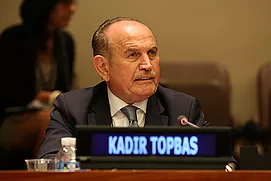
The Local and Regional Authorities Major Group and the Global Taskforce celebrated the formal session on Vertical cooperation - local authorities and national governments working together for implementation of the 2030 Agenda, where the Mayor of Istanbul, President of UCLG, and facilitator of the Global Taskforce, Kadir Topbaş, was invited to share the constituency’s positions and proposals. He pointed out that the effective review and follow-up of SDG implementation worldwide should take into consideration, not only the contributions of each country, but also the specific needs of different cities and regions, to avoid leaving anyone behind. Mayor Topbaş also called for the creation and development of the necessary enabling environment to allow the local and regional governments to play their full role in the achievement of the SDGs on the ground, including through a localization process, recognizing and valuing the role of local leadership and encouraging local leaders make the SDGs their own.
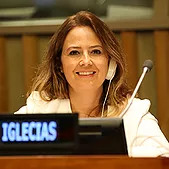
In the same session, the Secretary for Environment for the State of Sao Paolo, Patricia Iglesias, shared the specific perspective of states and regions, highlighting the need of internal cross-sectoral coordination and subnational SDG strategies.
The localization of the SDGs was supported by Member States including Germany, Philippines and Mexico and other Major Groups, in order to reach, not only urban, but also rural, populations, create ownership at all levels and ensure the most relevant policies, based on desegregated and territorial data.
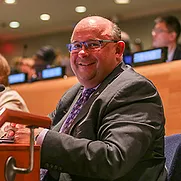
Another formal session “From inspiration to action: Multi-stakeholder engagement forimplementation” offered major groups and other stakeholders an opportunity to report on their contribution to the implementation of the SDGs and speak to the topics of the HLPF. Mayor Berry Vrbanovic was invited, as lead discussant, to share the experience of the Major Group of Local Authorities in implementing the 2030 Agenda. He highlighted how much of the work is done already at local level, as part of local and subnational governments’ ongoing work in their territories that relates to the achievement of the SDGs. He highlighted the challenges they face and the efforts made by their global, regional and national associations to ensure information flow and capacity building, including through the definition of a “Roadmap for the implementation and monitoring at subnational level of the SDGs”, a collaborative publication of the Global Taskforce, UNDP and UN Habitat and published ahead of the HLPF.
The Roadmap, which is a first step towards a Toolbox for Localizing the SDGs, which aims to support actions and policies of local and regional governments and other local stakeholders, was officially launched during a side-event "Localizing the SDGs: transforming global goals into local realities” co-organized by UCLG, UNDP and UN-Habitat. The roadmap provides guidelines and practices to support awareness-raising; sub-national advocacy in national SDG processes, implementation and monitoring and evaluation.
Local and regional government representatives used slots during the sessions to address Members States and the UN to call for the SDGs to be linked up with other major international agendas, particularly the New Urban Agenda to be adopted at Habitat III in October. We also recommended the organization of regular conferences on SDG implementation at the subnational level to contribute to the Global Review process, with the support of the UN and interested Member States, and recalled that national strategies to implement the SDGs need to take in account local policies to tackle the territories where results must be delivered.
Célestine Ketcha Courtès, Mayor of Bagangté, Cameroon, and President of the Woman Mayors Network of Africa, intervened during the two last days of the Forum, reacting to the National Voluntary Reviews presented by Member-States. She underscored to the importance of national SDG strategies recognizing that local governments are at the forefront of tackling most of the issues addressed by the SDGs in the daily work, saying: “Local authorities have a fundamental role in ensuring the safety, security, livelihoods and wellbeing of our communities. We need to find the concrete application of the report of the UN Secretary General that states many of the investments to achieve the sustainable development goals will take place at the subnational level and be led by local authorities.”
Roadmap for Localizing the SDGs: implementation and monitoring at subnational level
#HLPF2016 on Twitter

